
It’s never been entirely clear what happened with Black Friday (1940). It started life as a bonafide Boris Karloff-Bela Lugosi horror film with Lugosi playing the part of European refugee and moderately mad doctor Ernest Sovac, and Karloff as the timid English professor who inherits the brain of a gangster following an accident. And just imagining what the film might have been like with Lugosi in a lead (certainly, a more likely European refugee than Karloff) makes what we ended up with maddening. But that’s not how it played out. Instead, Karloff played Sovac, Stanley Ridges played the English professor (I guess the idea of Lugosi as a professor of English literature was too much to consider), and Lugosi ended up in the fairly minor role of gangster Eric Marnay. Why? The most common — and likely — reason is that Karloff was fine as Prof. George Kingsley, but ludicrous as the gangster Red Cannon, so he got shunted to the mad doctor, Lugosi got fobbed off with the Marnay role and Stanley Ridges got the best role of his career.
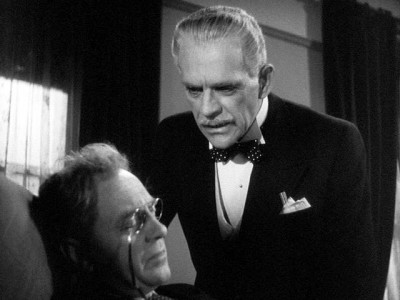
Now, Karloff had played gangsters in the early ‘30s — and they were not among his most worthy (or credible) roles, so this is the most likely answer. It’s also the kind of answer that would likely delight Universal executives. Lugosi’s diminished role could be shot in a week — so much the better. And the truth is that Lugosi’s portrayal of Marnay is nothing to sneeze at. Actually, it’s more interesting than Karloff doing yet another mad doctor much like those he was in the midst of knocking out over at Columbia. That’s fine, but in the midst of all this it seems that no one realized that they were going to end up with a Karloff-Lugosi picture in which the two never shared a single scene. This particular blasphemy has always tended to make Black Friday fall into greater disrepute than it deserves. Sure, it’s vastly inferior to the other Karloff-Lugosi vehicles from Universal, but it’s actually a pretty sharp little horror film — and of some note historically.
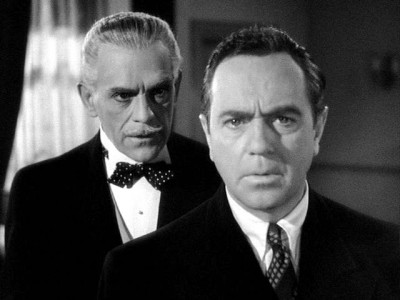
Though Karloff himself had played around with brain-transference in the 1936 British production The Man Who Changed His Mind, Black Friday is the film that ushered in the seeming mania for swapping brains that became a fixture of 1940s horror. Here, it hadn’t even been clearly thought out. When Sovac decides to save the dying Kingsley, he informs us that the only possible way is by a “brain transplantation,” which he feels compelled to tell us is “a dangerous and illegal operation.” (Legally, it seems unlikely the subject had ever come up, but doubtless it would be frowned upon.) The script is a little sketchy on just how and why this wouldn’t result in the recipient being effectively turned into the donor — something they try to patch up later by claiming that part of the brain is still that of the body’s original owner. Well, science was never the strong suit in these movies.
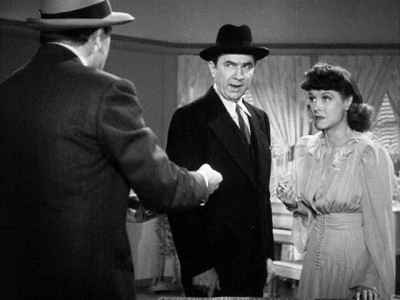
This all starts out as a purely humanitarian and leads to mad doctoring (isn’t that always the way?). Unfortunately, when Sovac learns that the dead Red Cannon had $500,000 in ill-gotten gains salted away, it occurs to him that Cannon’s brain — even while housed in Kingsley’s body — might retain the knowledge of where this stash is hidden. The temptation to get his hands on that much jack — with which he can build his own research laboratory — proves too much and Sovac proceeds to try to learn the secret.
His scheme involves taking his convalescent friend to New York — specifically to Cannon’s old haunts and to see Cannon’s girlfriend, Sunny Rogers (Anne Nagel). Naturally, it works (otherwise there’d be no movie), but it has the expected side effect — namely Kingsley turning into his gangster alter ego at inconvenient times. All in all, it makes for a pretty solid story, and the transformations between the two characters are wonderfully subtle and rely mostly on Stanley Ridges’ performance. (The question does arise as to just exactly why the timid professor’s pince-nez disappear at every transformation, yet are always back when he reverts.)
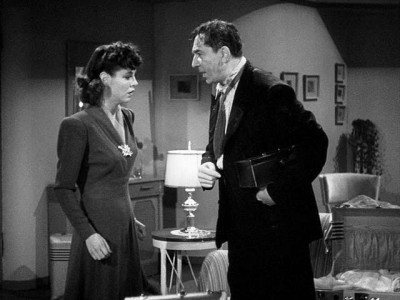
Most the film’s horror content — apart from the mad doctor stuff and the Jekyll and Hyde business — concerns Cannon getting his revenge on his old gang for trying to kill him, which is where most of Lugosi’s limited footage comes in. (Lugosi is in about eight minutes of the film’s 70-minute running time — despite his above-the-title billing.) For the Lugosiphile, there’s some pretty choice material here — not in the least his response to the announcement that the presumably late Red Cannon has paid a visit to Sunny, “What did he drive up in? A hearse?” It’s an interesting, often subtle portrayal that suggests both menace and cowardice in just about equal measure. His one big scene — the one played up by the publicity boys in 1940 with claims that the actor was actually hypnotized into believing he was suffocating in a closet — is certainly memorable. (For the record, no, he wasn’t hypnotized.)
It’s not a great horror film — and certainly it’s not a great Karloff-Lugosi vehicle — but Black Friday is a slickly made, fast-paced bit of horror. It’s the kind of remarkably well-made, good-looking picture that Universal could turn out in this era. And it’s most certainly worth a look for any serious horror fan.


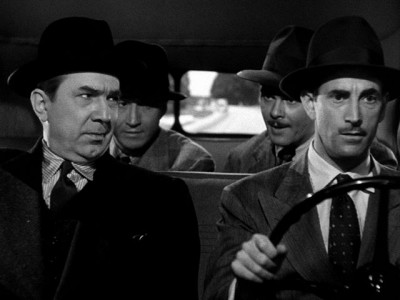
Before you comment
The comments section is here to provide a platform for civil dialogue on the issues we face together as a local community. Xpress is committed to offering this platform for all voices, but when the tone of the discussion gets nasty or strays off topic, we believe many people choose not to participate. Xpress editors are determined to moderate comments to ensure a constructive interchange is maintained. All comments judged not to be in keeping with the spirit of civil discourse will be removed and repeat violators will be banned. See here for our terms of service. Thank you for being part of this effort to promote respectful discussion.